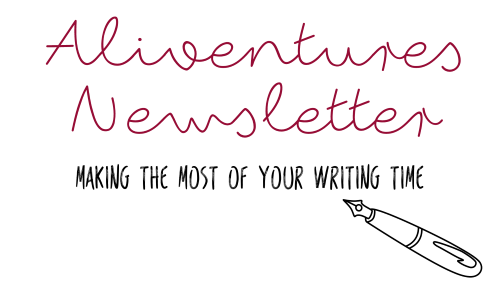Do you sometimes look back at your goals for the year and think ... gosh, that was a bit hopeful! I know I often do.
Maybe you set a really ambitious goal, like writing a whole novel. Perhaps your goal wasn't really in
your control, like landing an agent.
There's nothing wrong with setting goals that you change along the way, or attempt again the next year. But if you find it discouraging or feel that you've fallen short, it might be worth thinking about how you could adjust the way you set your writing goals for 2025.
You might want to think about:
Achievement vs Habit Goals
I came across this framework from Full
Focus (I use their excellent planners).
An Achivement goal is something like "write 4 short stories in 2025" or "land 2 new freelancing clients by 30th June".
A Habit goal
is something like "write for 10 minutes every day in 2025" or "send out 3 new queries each week until 30th June".
Neither type is right or wrong, but you might feel that one suits you better than the other. You may even want a mix of both.
Tip: If you want to write
but you're not sure what to work on, a habit goal could be a great way forward. You could aim to "spend 30 minutes exploring writing ideas twice a week" or "tackle a writing prompt for 15 minutes every Tuesday".
In Your Control vs Not In Your Control
Some goals are
fully in your control, like:
- Write for 10 minutes every day
- Write a chapter every week
- Spend an hour editing my novel each Saturday
Sure, things might happen to derail you, but the goal isn't dependent on anyone
or anything else.
Other goals aren't fully in your control, like:
- Get two new freelance clients
- Be shortlisted in a short story competition
- Have 1,000 visits in a month to my
blog
You can do a lot to influence those things, but external factors could push you off track.
Again, neither type of goal is right or wrong. You might find it's encouraging to have at least some writing goals that are 100% in your control, though.
Tip: If your goal isn't fully in your control, you'll want to set sub-goals that are. For instance, if you want to get shortlisted in a short story competition, your first sub-goal might be to ask a fellow writer for feedback on a draft story.
Vision vs
Goals
I talked to my coach Blake Stratton a couple of weeks ago about wanting to approach my goals a little differently in 2025.
He clarified the difference between a "vision" and a "goal" for me.
A vision is where you want to be; a goal is a possible route (perhaps even an experiment) that you hope will get you closer.
For instance, your vision might be "become a published author". A
goal that could get you closer is "write a synopsis and cover letter, and approach ten agents".
Separating your goals from your vision means you can try things out and not feel guilty if they don't work. Maybe you don't land an agent and you decide to go down the self-publishing route instead. Or maybe you book a one-to-one meeting with an agent through a writing conference, so you can be
sure they'll read your work.
Later this week, I'm recording a goal-setting workshop for Writers' Cafe members. This will go
into lots more details about the topics we've covered over the past three weeks in the newsletter. It's not too late to join us! Our doors are always open and we'd love to help you get your 2025 off to a great start.
Happy writing,
Ali
P.S. No blog post last week (Thursday was my 40th birthday and I ran out of time to blog) but here's the post from two weeks ago, in case you missed it:
Indirect Characterisation: What Is It and How Is It Different From Direct Characterisation?

